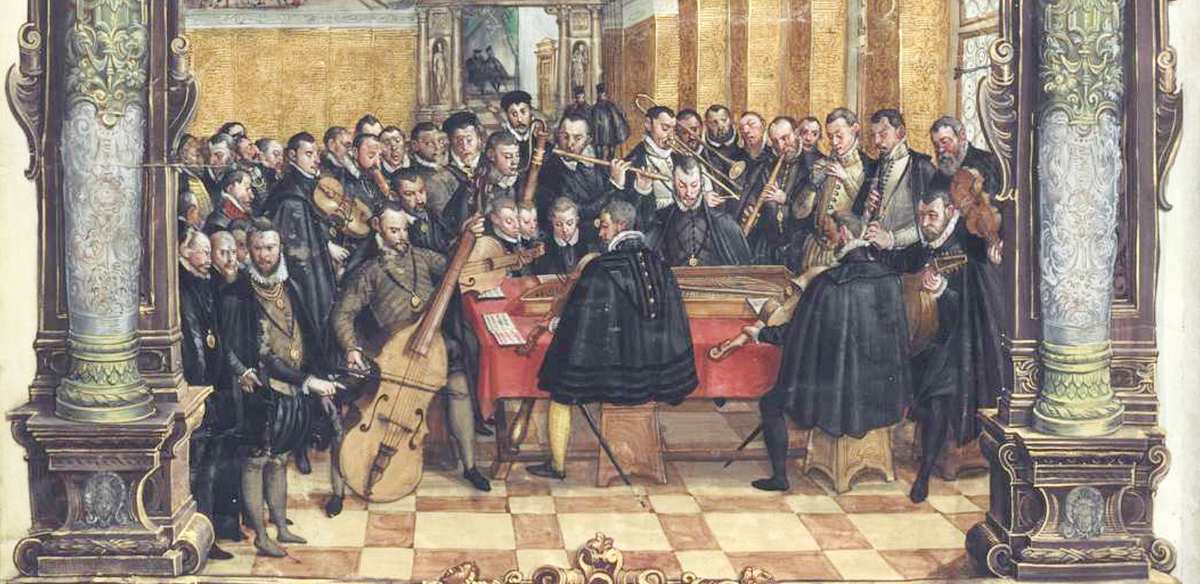The beauty of Christmas carols is their mix of joy with sadness - and the ultimate victory of hope over sadness. This is true of other traditional spiritual music too.
Emma Tristram is preparing for the June 2018 Binsted Arts Festival. She has been listening over and over to the CD of Lassus’ Five-Part Lamentations, by Philippe Herreweghe’s vocal group. The music is sublime and joyously sad. Orlando Lassus was a 16th-century singer and composer who worked throughout Europe: here is a contemporary painting of him at work.

Emma is hoping to organise an informal concert performance, using viols and voices, as part of the 2018 Binsted Arts Festival. For this, she is helping to edit a viol edition (i.e. with separate instrumental parts) of the Lamentations for publication by Particular Music.
Binsted Church may be going to host the world premiere performance from this first viol edition. We have asked Emma to tell us more, to whet your appetite. Have a happy Christmas, and read on!
Emma writes:
We hope the concert will be informal so you can wander in and out and perhaps bring a picnic to eat in the churchyard. Time and place: probably 12.30 pm on Sunday 10 June 2018 in Binsted church, BN18 0LL. The Festival will take place on 8-10 June but, compared with last year, will be slimmed-down in case some of the organisers are fighting a Bypass at the same time.
Lassus was a master of the Renaissance method of word-setting in which the music physically mirrors the text. If Jerusalem ‘sedet sola’, ‘sits alone’, there will be a note on its own. If foolishness is mentioned there may be a nonsensical musical cadence. If someone is ‘walled in’, there may be a cascade of musical figures giving a sense of enclosure. Ideally there would be a projection of the Latin (and English) words on a screen to accompany the music – we may not manage that but there will be a translation.

Various programme notes tell us that ‘Lamentations’ is a poetic text of the Hebrew bible, ascribed to Jeremiah. It mourns the destruction of Jerusalem and the Holy Temple in the 6th century BC. This programme note struck a chord: ‘The Lamentations are part of a literary history which, in an outpouring of sorrow, details the destruction of human settlements by natural disasters or manmade events’. If Highways England choose the Arundel Bypass route known as 5A which would destroy the beauty of the ancient human settlement of Binsted, the concert will be partly a reaction to this – though there are many more stages to go through, and there may be a legal fight against the decision because of the error-filled and biased public consultation.

The programme note adds ‘From the 16th century, composers have set the Latin text of verses from the Lamentations for Christian services. The texts are spoken or sung in the days preceding Easter. The powerful images of destruction, desolation and confusion become a prophetic metaphor, linking Christ’s betrayal, arrest and crucifixion with the destruction of the Holy City.’ Three selections of Lamentations were made for each of three days, so there are often nine sections of Lamentations altogether.
A unique feature is that the Hebrew letters at the start of each verse, ‘Aleph, Beth’ and the like, which were simply verse numbers, are also set to music – usually more meditative, lavish and sorrowful than the starker, more narrative setting in the actual verses. And each section ends with a call to Jerusalem to ‘return to the Lord thy God’.
However far things may go wrong: there is hope, if people can change their ways. Happy Christmas!

